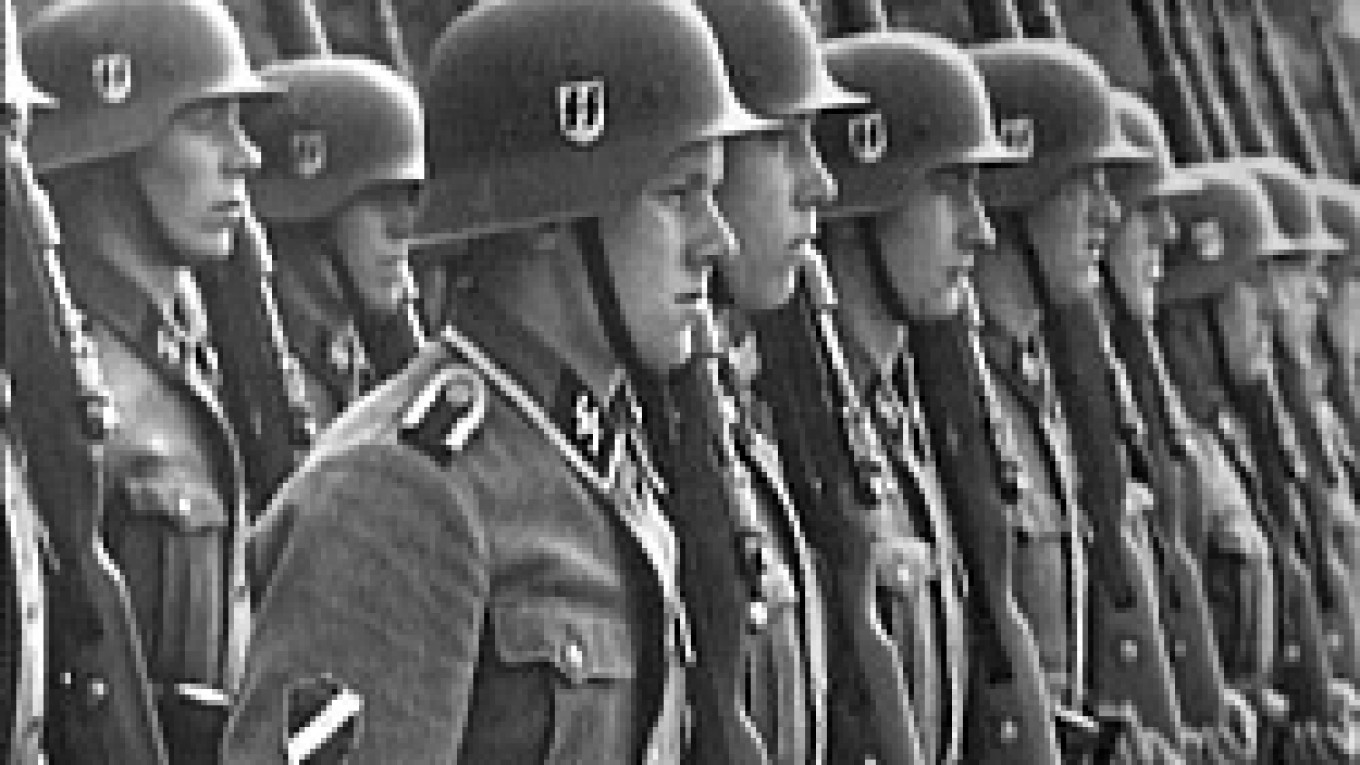"Nazism, Baltic-Style" (Natsizm Po-Pribaltiisky) was commissioned by the channel and filmed last year by the Trety Rim, or Third Rome, production company. Notably, the documentary aired on March 16, the same day that veterans of the Latvian Waffen SS held their annual comemmoration -- an event that has become a sore point for Russian-Latvian relations.
The Latvian Waffen SS, also known as the Latvian Legion, was formed while the country was occupied by Nazi Germany. Some Latvians now regard the legionaries as freedom fighters because of their role in fighting the Red Army. The Soviet Union invaded Latvia in 1940, only to be expelled by German forces one year later. As Soviet forces advanced westward in 1943-44, about 150,000 Latvians were conscripted into the legion in a last-ditch effort to stave off the Red Army.
The documentary, however, focuses on the volunteers who fought willingly on the side of the Nazis. In interviews mixed with archival footage, the filmmakers examine the 15th and 19th police divisions, voluntary units that were integrated into the legion -- and that gained notoriety for committing war crimes against Latvia's Jews. During the war, 95 percent of Latvia's prewar Jewish population was murdered by the Germans and their local collaborators.
The film features testimony from some former pro-German volunteers. One elderly Latvian, introduced as a former legionary, says that he was actually fighting for a different military grouping. "I have never been a member of the Waffen SS," he says. "It's a different organization. When I enlisted into the army, I was told I would serve in the Grenadier Guards."
Many other people interviewed, however, are pro-Russian politicians and activists who argue that the legion's activities cannot be justified because, they claim, Latvia voluntarily agreed to join the Soviet Union in 1940.
"What happened was in line with legal norms of that time," says Alfred Rubiks, the last Soviet-era leader of the Latvian Communist Party, who spent six years in prison after Latvia gained independence and now heads the country's Socialist Party. "The decision to become part of the Soviet Union was taken by the Diet."
Nikolai Kabanov, a member of the Latvian parliament who has campaigned for the rights of the country's Russian-speaking minority, expresses a similar view: "Occupation means a state of war, but Latvia wasn't in a state of war with the Soviet Union in June 1940."
Most historians would argue that such claims are distorted. In June 1940, hundreds of thousands of Red Army soldiers entered Latvia and its Baltic neighbors. The Soviets then held rigged elections to install a puppet government, which formalized the country's annexation to the Soviet Union.
In December, "Nazism, Baltic-Style" sparked a furor in Latvia when Kabanov organized a screening of the film. Nationalist lawmakers wrote to the country's prosecutors and to the Russian ambassador in Riga, alleging that the film incited ethnic hatred and requesting to have it banned from public viewings, in both Latvia and Russia. Latvian prosecutors ultimately decided not to block the film.
Later, with TV Center still planning to show the film, the Latvian Embassy in Moscow asked the channel to either take it off the air or broadcast it together with a response from the Latvian ambassador, Andris Teikmanis. The channel agreed to broadcast his comments, which were aired about half an hour after the film ended.
Teikmanis admitted that Latvian soldiers had taken part in executions of Jews, but he also said that in 1939-40, some 3,000 Jews had fled Nazi ghettos and taken refuge in Latvia. He also downplayed suggestions of neo-Nazism in Latvia today. "In Latvia, the SS is a criminal organization," he said. "If anyone appears in the street and puts up his arm in a Nazi salute, he will not go far."
Until recently, the Latvian government allowed Waffen SS veterans to march through Riga on March 16. Following international criticism, the veterans now hold a quieter ceremony outside the capital. But the date still has the power to mobilize Latvian nationalists -- last week, about 200 of them held an unsanctioned rally in central Riga, where they were met by about 70 Russian-speaking counter-demonstrators.
In Russia, the annual tribute to the Latvian Legion continues to anger many -- including Boris Chertkov, producer of the documentary. "I took up this film only because I wanted to hear the legionaries say they had strong reasons to fight under the Nazi banner," Chertkov said at a news conference last week. "But I never heard anything of the kind from them."
Chertkov accused the legionaries of refusing to take responsibility for their past failings. "What is happening [in Latvia] now," he said, "is a pure justification of cowardice."
A Message from The Moscow Times:
Dear readers,
We are facing unprecedented challenges. Russia's Prosecutor General's Office has designated The Moscow Times as an "undesirable" organization, criminalizing our work and putting our staff at risk of prosecution. This follows our earlier unjust labeling as a "foreign agent."
These actions are direct attempts to silence independent journalism in Russia. The authorities claim our work "discredits the decisions of the Russian leadership." We see things differently: we strive to provide accurate, unbiased reporting on Russia.
We, the journalists of The Moscow Times, refuse to be silenced. But to continue our work, we need your help.
Your support, no matter how small, makes a world of difference. If you can, please support us monthly starting from just $2. It's quick to set up, and every contribution makes a significant impact.
By supporting The Moscow Times, you're defending open, independent journalism in the face of repression. Thank you for standing with us.
Remind me later.


